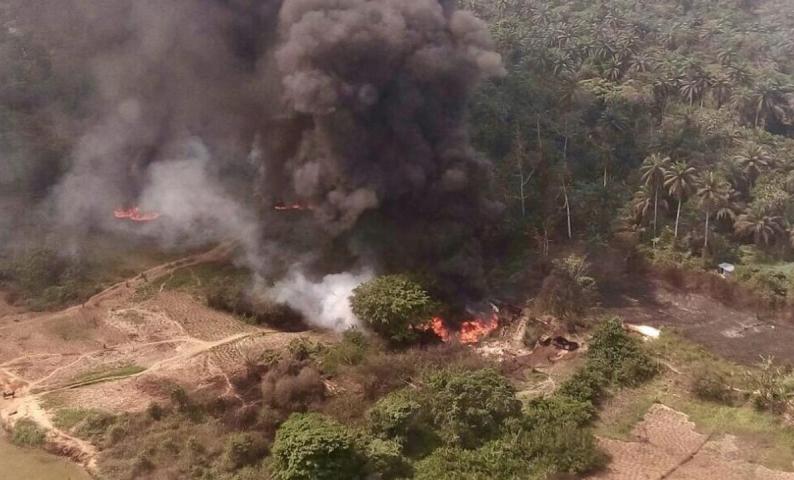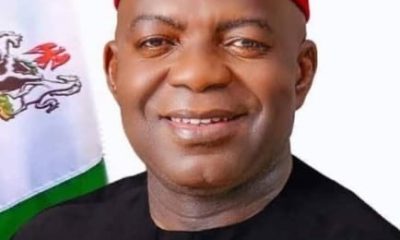NEWS
Islamism and Jihadi Terrorism in Northern Nigeria

By Majeed Dahiru
For a region that has been plagued by terror groups, ranging from the Mai Taisine riotous sect in the 1980s to Boko Haram insurgents in the 2000s, the emergence of a new Islamist group in the Muslim north of Nigeria has become one too many.
Given the name “Lakurawa” by the locals, this new terror group that has been identified by Nigeria’s security forces is operating out of Kebbi and Sokoto states in North-West Nigeria, along the border with the Republic of Niger.
Said to be made up of foreign elements from the Sahel, the Lakurawa first appeared in northern Nigeria sometime in 2017 as a reformatory religious group, comprising skilled herdsmen who were armed.
And with their relatively high armament capabilities, they helped protect herder communities from the criminal activities of cattle rustlers under a transactional arrangement.Described as a “faith based group” by the government of the affected states, the Lakurawa group, in addition to helping herder communities combat cattle rustling, also engaged in proselytising the people into their own version of Islam, just as they began to exercise quasi-judicial functions in line with the Sharia.
Like the Boko Haram, whose real appellation is Jama’at Ahl-as Sunnah lid-Da’wah wa’l-Jihad (Congregation of the People of Prophetic Tradition for Proselytisation and Armed Struggle), the Lakurawa seeks to establish a puritan Islamic state in Nigeria to be ruled by its own version of Islamic law.
While Nigeria is still battling to extinguish the fires of Boko Haram insurgency in its North-Eastern corner, the emergence of Lakurawa in the North-West, which is said to be heavily armed and in control of some villages as well as communities in Sokoto and Kebbi states, is a clear indication that the Muslim north of Nigeria is a fertile ground for the planting, germinating and nourishing of the seeds of radical Islamist ideology that eventually blossoms into Jihadi groups like Mai Taisine, Boko Haram, Ansaru and Lakurawa.
And the main element of this fertility is the dominance of Islamism in the mainstream Islamic theological framework in the Muslim north of Nigeria. In fact Islamism, which is “a broad set of political and religious ideologies that dictates Islam should guide and influence the political and legal system of the state in opposition to secularism,” is mainstreamed in the Muslim north to the extent that political Islam is being surreptitiously deployed to undermine Nigeria’s secular constitutional democratic order.
The continuous and pervasive proselytisation of Islamism in the Muslim North within a larger Nigeria, which is a multi-religious and cultural country, is a form of self-immolation that is now threatening to incinerate the entire country.
Self-immolation because the epicentre of Jihadi insurgency in Nigeria has been Borno, the oldest place of Islam Nigeria, and now Lakurawa has just emerged from Sokoto, the seat of the Caliphate. And the collective incineration is in the fact that the Nigerian state will continue to be responsible for the containment of Islamist insurgency through its security forces.
But before the rest of non-Muslim Nigeria grows weary of this collective incineration arising from the religious self-immolation of the Muslim North, it has become imperative to rethink Islamism, with the intention to reverse all of its influences through the deliberate reform of the mainstream Islamic theological framework that currently guides the Muslim faithful in Northern Nigeria.
To uproot the seeds of the radical Islamist ideology and render its soils infertile for the nourishing, germinating and blooming of violent Jihadism will require the reversal of Islamism and the secularisation of the Muslim North, going forward.
To this end, all instruments of political Islam, along with the imposition of religious laws (Sharia) and enforcement agencies (Hisbah) must be dismantled forthwith. There is an ideological convergence between purveyors of political Islam and Jihadi groups like Boko Haram and Lukarawa, as they all share the aspiration of the creation of an Islamic state in a religiously plural Nigeria. And, it is the failure of political Islam to achieve this utopia of an Islamic state that resulted in the use of arms to achieve the same goal.
Any region wherein people are mobbed to death for blasphemy, bottles of alcoholic beverages are destroyed and people of other faith treated as third class citizens, will always be plagued by Boko Haram and Lakurawa. The latter group, Lakurawa, for instance, was able to gain acceptance in parts of Sokoto and Kebbi states since 2017 because it is a faith based group with the same aspiration for a Sharia ruled Islamic state.
Secularism is not a substitute for religion, neither is it anti-religion. It simply means the separation of the state and religion in a multi-religious Nigeria. Fortunately, Nigeria’s secular constitution allows its Muslim citizens the uninhibited practice of their “Sharia faith” without hindrance.
What the constitution does not allow is the imposition of the laws and value system of one religion upon others within the federation of Nigeria. While the constitution does not impose the consumption of alcohol, pork and the committing of adultery as mandatory obligations of citizens, without exemption, Muslims should simply abstain from consuming these “haram items” without seeking to force others to do the same, especially those whose own religious or value systems do not prevent them from indulging in these items. And as long as the constitution guarantees Muslims the observance of Sharia faith, as it currently does, the advocacy for the adoption of Sharia law is as unnecessary as it is negatively disruptive.
The conflict between religion and citizenship in the Muslim North arising from pervasive Islamism is a major enabler of the incubation of Islamist jihadi terror groups. And the mainstream Islamic authorities have a responsibility to resolve this conflict by effectively separating religion from the state in the Islamic theological framework that guides the Muslim community in a region, as the most Islamic states are not the Muslim-dominated countries that are ruled by Sharia but plural, secular and democratic countries, where the principles of justice, equity and fairness reigns supreme, without prejudice to race, ethnicity and creed.
NEWS
Strike: JUSUN Members Lock out Judges, Lawyers, Litigants in Federal Courts in Ibadan

Judges, lawyers and litigants at the Federal High Court, Court of Appeal and National Industrial Court in Ibadan, on Monday, were locked out by protesting members of the Judiciary Staff Union of Nigeria (JUSUN).The national leadership of JUSUN had directed its members in the federal courts to embark on a strike on Monday over unpaid 25 per cent and 35 per cent salary increment, minimum wage and wage award.
A JUSUN official at the National Industrial Court, who craved anonymity, told Daily Asset in Ibadan that their salary was no longer enough as a result of current economic situation in the country. He said that the workers were seriously suffering while judges in the courts did not see them as part of them.According to the official, several steps taken to ensure their demands are met have been unsuccessful.The JUSUN representative said that no fewer than 10 members of staff of the National Industrial Court nationwide had died from February 2025 till date.“The suffering is too much and we are not asking for too much,” he said.Also speaking, a JUSUN official at the Court of Appeal, Ibadan, Mr Atanda Babatunde, said the strike was embarked on in compliance with the directive of the national leadership of JUSUN.Babatunde said that the strike would continue untill their demands were met.A lawyer, Mr Ismail Saka, who was at the Court of Appeal, Ibadan, expressed his disappointed over the strike.Saka said that he had been notified of his case coming up today and was surprised to have been locked out due to JUSUN strike.He said that one of his clients came from Sango-Ota, Ogun State, for the case, risking his life and wasting time and resources.He said that it was the right of JUSUN to embark on strike due to their entitlement while everyone was aware of the current economic reality in Nigeria.‘I urge the federal government to be compassionate and pay them their demands, which will make them live comfortable lives and not to be corrupted.Also, Mr Wale Oyegoke, who had a case at the Federal High Court in Ibadan, said he was angry that his case did not hold as a result of JUSUN strike.Oyegoke said that the Federal Government must treat the judiciary workers well, being a sensitive area.He said that the cost of living in Nigeria was already high while government was getting enough money due to subsidy removal.“The cost of transportation is very high, and if care is not taken, these staff will spend all their earnings on transportation.“I, as a person, spend N60,000 weekly on transportation.“Leaving home today, I thought my case would go on, but I am dsappointed that cases are not going on due to the strike.,” he said.A litigant, Mr Seye Olawale, who came from Lagos State, said that he was seriously pained risking his life on the bad road and wasting time and resources to come to Ibadan.(NAN)NEWS
C’ River Govt. Threatens to Sanction Firm for N1.2bn Unpaid Tax

The Cross River Government has threatened severe penalty on a firm, Bao Yao Iron and Steel Company, for owing the state N1.2 billion accrued tax liabilities.This was disclosed by Mr Ayi Bassey, Director Compliance, Cross River Internal Revenue Service (IRS) on Monday during a compliance drive by the service to the premises of the firm in Calabar.
Bassey said the service had taken steps provided by law but the company refused to discharge its statutory responsibility to the government. “We have served them demand notice, final demand notice; for four periods they have been issued pre action notices and they have done nothing to show they have a responsibility to the state.“As a service, we view this as a deliberate attempt on the part of the management of the company to undermine the developmental efforts of the present administration in the state.“We have placed the non compliance stickers as our final demand to them, beyond this, we will take necessary steps to ensure we enforce compliance,” he said.On his part, Mr Emmanuel Esira, Director Legal Services and Enforcement of Cross River IRS said the visitation was a further administrative step to get the company informed of their indebtedness to the government.According to him, “the tax we are asking for are deductions from staff salaries that have not been remitted to the tax authorities in the state since 2009.“The notification stickers will be on their premises until they comply and if they don’t respond, we will take further actions.Esira urged other companies doing business in the state not to allow situations to get to the point where they have to paste non compliance stickers in their premises before they carry out their obligations. (NAN)NEWS
Court Remands Man for Allegedly Stealing Electric Cable

A Badagry Chief Magistrates’ Court in Lagos State on Thursday, ordered the remand of a 35-year-old man, Segun Deala, for stealing Eko Electricity Distribution Company (EKEDC) cable.Deal whose address was not provided, had pleaded guilty to a two-count charge bordering on stealing and breach of peace.
The Chief Magistrate, Nurudeen Layeni ordered that he should be kept at the Awhajigho correctional facility in Badagry. He adjourned the case until Aug. 14, for fact and sentencingEarlier, the prosecution, ASP Edet Ekpo told the Court that the defendant committed the offences on May 9, at about 2p.m., at Gbenapon Ajara-Topa, Badagry, Lagos.Ekpo said that the defendant stole some length of electric cable with value yet unknown belonging to the EKEDC .He said the defendant conducted himself in a manner likely to cause breach of peace by destroying the cable.According to prosecutor, the offences contravened Sections 287 and 168 of the Criminal Law of Lagos 2015.














